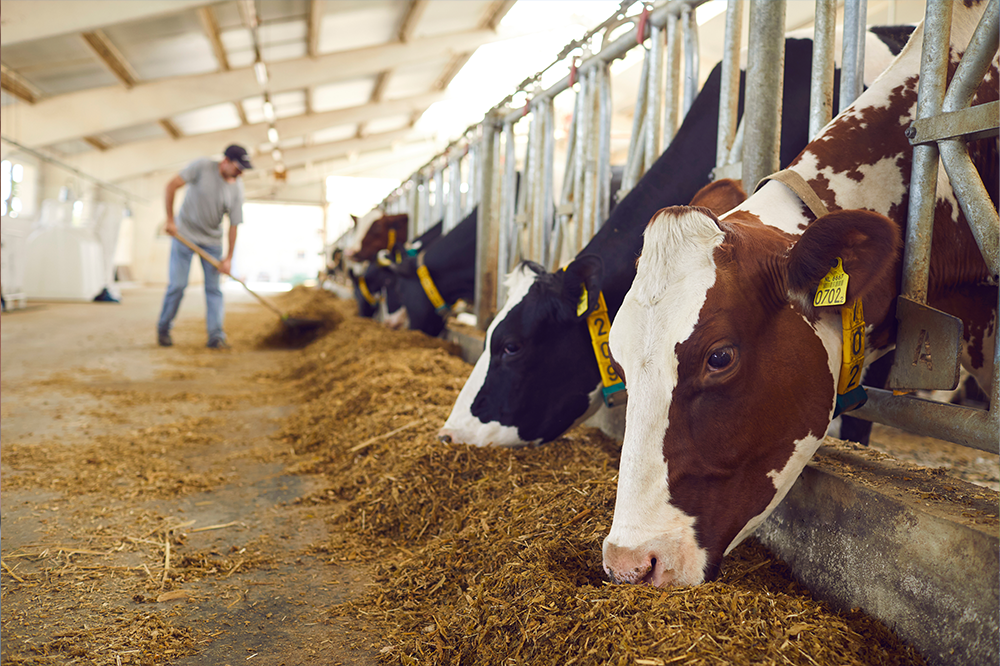We start with a story about methane, cows and a feed additive beginning with B: a new study by researchers at the University of California, Davis, found that feeding grazing beef cattle a red seaweed-based supplement (Brominata) in pellet form reduced their methane emissions by almost 40% without affecting their health or weight. The study, published in Proceedings of the National Academy of Sciences, is the first to test seaweed on grazing beef cattle (previous studies showed seaweed cut methane emissions 82% in feedlot cattle and over 50% in dairy cows).
“Beef cattle spend only about three months in feedlots and spend most of their lives grazing on pasture and producing methane,” said senior author Ermias Kebreab, professor in the department of animal science at the university. “We need to make this seaweed additive or any feed additive more accessible to grazing cattle to make cattle farming more sustainable while meeting the global demand for meat.”
And there is anther story about methane from agriculture this week: 35 non-profits have written to Ursula von der Leyen, president of the European Commission, to “stress the urgency” of mitigating methane in the next five years. There was, you might recall, a Global Methane Pledge at COP26 in Glasgow, led by the EU and US; some 159 countries have now pledged to cut the short-lived yet powerful greenhouse gas by 30% by 2030 (versus 2020 levels). There has been some progress, with actions plans, and in Europe new regulation to cut methane from the energy and waste sectors. However, the pledge “stands at a crossroads”, the NGOs warned vdL. “In the agriculture sector, this requires transforming the EU food system away from industrial animal agriculture and towards more sustainable practices and consumption patterns for better health and climate,” they wrote.
Indeed, in terms of anthropogenic sources of methane, energy accounts for 19%, waste 27% and agriculture 54%. “The EU must develop legislative levers for the livestock sector in the same way it has for the energy sector,” Gemma Hoskins, senior director at the NGO Mighty Earth, told Ends Europe recently. She said halving EU consumption of pork and beef, and cutting milk consumption by 25%, could reduce agricultural methane emissions by between 29% and 27%, or 15% to 19% of the bloc’s total emissions of the gas.
Next month a host of big brands on the high street and across the packaged food sector will offer 31 days of support to this dietary shift. We speak of course of Veganuary – for which registration is now officially open. This year’s campaign is a head-, or should we say herd-turner: Vegconomist reports that through the use of ads with “jarring imagery, the ‘WEIRD?’ campaign asks viewers to consider the practices behind some of the most commonly consumed animal products”. The campaign will for example highlight that: sausages are pigs stuffed into their own intestines; cows make milk to feed their babies, just like human mothers do; and chicken often comes from birds bred to grow so big that they can barely stand.
Speaking of such chickens, there was a warning shot from Compassion in World Farming this week. “The foodservice sector cannot rely on retailers to lead the way,” said Tracey Jones, global director for food business at CIWF. “It must take responsibility for its own actions and drive change within its sphere of influence.” She was speaking of the Better Chicken Commitment, which is under threat after KFC admitted last month that it has little chance of it meeting the 2026 deadline – in small part because it can’t switch quick enough to slower-growing breeds of bird. CIWF is to launch a ChickenTrack report in March to “shine a spotlight on companies making progress and call out those lagging behind”.
For the next month, though, the focus will be on turkey. And probably milk, still. Indeed, the other way to shift consumption away from dairy and cut methane is to create a social media snowballer story claiming that the cows are being fed pills from Bill (Gates) that stymie their belches but poison their milk. You will have read all about this so we won’t Bovaer going into more detail here. Suffice to say, hats off to The Grocer for the best headline (which we have just plagiarised), in a story that hones in on the part of the Food Standards Agency’s approval for the methane-inhibiting supplement that caused such a stir: that it “should be considered corrosive to the eyes, a skin irritant and potentially harmful by inhalation”. That’s the case for a host of other chemicals used on farms, said one source, notably without a hint of irony or concern.
The levels of pesticides on UK and imported foods are one our other items this week. Plus we look at research showing the growing presence of fast-food chains around schools. There is potentially good news – a new food strategy for England is being planned – and bad – as food insecurity rises (and will continue to do so as the climate and nature crises converge on a fragile food system).
And on that note we leave you with a comment from Dan Crossley, executive director at The Food Ethics Council, who used his regular column in The Grocer to call for an end to “shot-in-the-arm” solutions as we jump seemingly from one food system crisis to the next.
“The layers need peeling back,” Crossley explained. “We should interrogate why we are doing things the way we are. We should be asking why problems of injustice, ill health and oversupply are happening to begin with. We need to be honest about the structures that prop up the current food system.”








